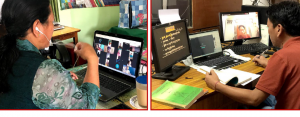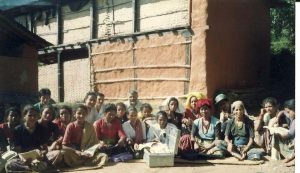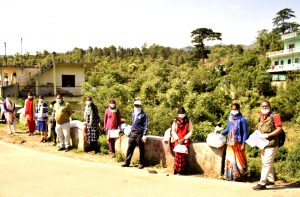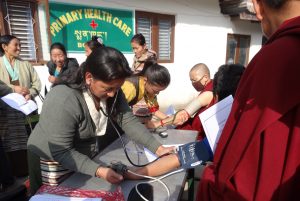Tibetan Children’s Village, Lower Chauntra 2020 Educational Report
The children are still receiving an education in spite of the pandemic. Click here to read their report for 2020.

The children are still receiving an education in spite of the pandemic. Click here to read their report for 2020.

Project #328 – 2019-2022
A shocking statistic: Although there has been great improvement in recent years, Nepal continues to have one of the highest maternal death rates in the Asia Pacific region, with 279 women dying per 100,000 live births, according to recent UN data.
For more than 20 years, the Innovative Development Education Academy (IDEA) in Pokhara, Nepal, has been running an 18 month midwifery education/training course for girls and women from remote areas of Nepal which will help to save lives of mothers and children in those areas.

The Academy is well established and well regarded. Many young women from cities like Kathmandu and Pokhara receive training there, paying their own way – but inevitably they look for work in urban settings. So IDEA looks for international support to help pay for the young women from rural areas to receive this vital training. Most of these graduates return to their own villages and do sterling work in helping to save the lives of mothers and babies.
In 2019, TRAS partnered with IDEA assisting 4 underprivileged students in paying for their 18 month Midwifery course.
See Page 6 in our December 2019 Newsletter to see how the 4 students are doing.
Early 2020 all students were sent home due to the Covid-19 pandemic, with kits to help people in their home villages, while studying as much as possible online. This raised a question: how would they be able to study online? The cost per student, to purchase an iPad or smart phone, internet service and data plans has been about $600; so TRAS has offered to pay $2,400 for the four students we are sponsoring.
Project #330 – 2022
Voice of Children (VOC) is run by AMAN and Vimarsh, two NGOs in Almora and Nainital Districts of northern India, and supported by TRAS for many years.
Both NGOs, through the Voice of Children project, are involved in providing educational and health programs for the children of the remote villages in this mountainous region. With the arrival of the COVID-19 pandemic, and the subsequent lockdowns, the NGOs turned their attention to relief support for the poor and stranded residents in the VOC field area.

The pandemic significantly impacted the life of the locals, particularly those dependent on daily labour. Government support of a maximum of 5kg of rice per month to families identified as living below the poverty line was not enough. Also, the financial support of $9 per family per month barely helped.
The villagers were facing a shortage of food, cash, and hygiene products. The small energetic VOC team was given permission to travel in spite of the lockdown and reinvented itself to help provide the most destitute villagers with emergency food and hygiene supplies, which our donors swiftly paid for in early May ($5,000). Then, as the villages were overwhelmed by the returning migrant workers later that month, the VOC team supplied makeshift quarantine centres with vital supplies of food and hygiene products, again paid for by TRAS ($5,000).
As soon as they were able, the VOC teams restarted informal educational programs under strict safety guidelines. Classes were held for the high students to keep up their English, math and science studies, while the younger children were encouraged to learn to read and write. All classes were held outdoors, with the children distanced and masked. The benefits of being there for the children, of making life more normal, of calming their fears were huge.

The VOC team could see firsthand which children were hungry, which families were struggling, who needed help buying batteries so that students could access online learning. They saw young mothers desperate for advice and supplies for their newborns. They have asked for one more emergency fund to be used where needed most. A third payment of $5,000 was sent in September for this purpose.
Click here to read the VOC Emergency Response to Pandemic Covid-19 report
Click here to read the VOC Emergency Response to Pandemic Covid-19 report – 2nd phase
Project # 331 – 2020

For six months, until the end of September, 2020, the Central Tibetan Administration (CTA) was able to fund, with support from the United States, all the COVID-19 related expenses of the Tibetan clinics, health posts and hospitals in India and Nepal, but that funding ran out at the end of September. The Department of Health has urgently requested all the friends of Tibet to help in the struggle to keep the virus at bay in the many settlements.
So far, they have done a superb job of training staff and teaching the residents to follow good practices. Now they need protective equipment, testing capabilities and medical supplies to continue keeping their population safe. 1,043 Tibetans in India and Nepal have caught the virus and, sadly 23 have died.
The Department of Health has created an excellent plan of quarantine, containment, testing, tracing and treatment – but it will only happen with funding. Out of the request for $140,000 to cover costs for one year, TRAS promised to pay the $14,000 needed to purchase a year’s worth of personal protective equipment (PPE) for all the staff and helpers in the 12 Nepali clinics.

The project will be overseen for the Department of Health by the Snow Lion Foundation (SLF) in Nepal, which administers 12 Tibetan schools, 12 health posts and a seniors’ home. TRAS has had a good relationship with the SLF for many years, helping with several of its projects.
Project total $14,000 A Big Thank You to everyone that helped us achieve our goal.
Jan 7, 2020 Read here for update
May 3, 2021 Read here for current update
Since 1962, TRAS has funded an array of projects in India, Nepal and Tibet. These range from a large ten-year integrated rural development project amounting to nearly $1million, to ongoing multi-year educational and health-related projects of $30,000 to $60,000 each, to smaller projects needing annual or one-time donations of $2,000 or $5,000. TRAS has funded just over 300 projects in the region.
The early thrust of TRAS’s work was directed to supporting Tibetan refugees. Later TRAS funds contributed to the creation of the Tibetan settlements in northern and southern India. In the 1980s, TRAS reached out to Indian villages near and beyond the Tibetan settlements, and gradually was able to take on larger integrated rural development projects in Nepal as well. Current TRAS-supported projects continue to support our belief that communities thrive when their children are healthy and educated.
TRAS works in partnership with local non-governmental organizations (NGOs) in India, Nepal and Tibet. We send no westerners abroad to manage or to work on projects. We value the fact that we are able to assist local NGOs in their efforts to help their own people.
The benefits of working through local NGOs include:
The current projects are described below. (Click on the link for more information).
Support future nursing students through the Nurses Vocational Training Project
Support Indian village children’s health and education through the Voice of Children Projects
Support the education of Nepalese village children through the READI Nepal Humla Education Project
Support promising young students in post secondary education through the TRAS Scholarship Fund (TSF)
Midwifery training through the Innovative Development Education Academy (IDEA)
Voice of Children Covid-19 Emergency Response
Personal Protection Equipment for Tibetan Healthcare Workers in Nepal
To see the regions where TRAS-funded projects are located, please see the map of currently funded projects.